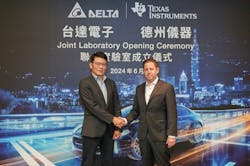Collaboration Forms to Advance EV Onboard Charging
The electric-vehicle (EV) onboard charger converts alternative current available on the grid into direct current that can charge the vehicle's battery. On-board chargers (OBCs) reside within the vehicle and are generally designed for lower kilowatts of power transfer than an off-board AC charger before supplying it to the battery-management system (BMS).
An off-board charging station, on the other hand, interfaces directly with the BMS. It’s part of the grid infrastructure and can be installed along a street, in a parking lot, or in a home garage. Like the OBC, its primary purpose is to supply the power to the vehicle for charging the battery.
TI and Delta Pact Eyes Onboard Power Solutions
On this front, Texas Instruments announced a long-term collaboration with Delta Electronics to create next-generation EV onboard charging and power solutions. This work will take advantage of both companies' research and development capabilities in power management and power delivery at a joint innovation laboratory in Pingzhen, Taiwan. Together, TI and Delta aim to optimize power density, performance, and size to accelerate the realization of safer, faster-charging, and more affordable EVs.
Critical differences exist between an OBC and the power electronic system placed between the power grid and the high-voltage battery pack located inside the vehicle. They require different charging currents and voltages. Both types of chargers must support different charging levels, types, and modes, which ultimately determines the battery charging time.
"The transition to electric vehicles is key to helping achieve a more sustainable future, and through years of collaboration with Delta Electronics, we have a solid foundation to build upon," said Amichai Ron, senior vice president for Embedded Processing at TI.
He added, "Together with Delta, we will use TI semiconductors to develop EV power systems like onboard chargers and DC-DC converters that are smaller, more efficient, and more reliable, increasing vehicle driving range and encouraging more widespread adoption of electric vehicles."
James Tang, executive vice president of Mobility and head of the Electric Vehicle Solutions business group at Delta Electronics noted that through the establishment of this joint innovation laboratory with TI, Delta intends to leverage TI's experience and advanced technology in digital control and gallium nitride (GaN) to enhance the power density and performance of Delta’s EV power systems.
From a 11-kW OBC to Next-Gen Power Solutions: 3 Development Phases
The collaboration will involve three phases of development:
Phase one focuses on Delta's creation of a lighter-weight, cost-effective, 11-kW onboard charger, using TI's C2000 real-time microcontrollers (MCUs) and TI's proprietary active electromagnetic-interference (EMI) filter products. The companies are working together to reduce the charger's size by 30% while achieving up to 95% power-conversion efficiency.
In phase two, TI and Delta will leverage C2000 real-time MCUs for automotive applications to enable automakers to achieve Automotive Safety Integrity Levels (ASILs) up to ASIL D, which represents the strictest automotive safety requirements. Highly integrated, automotive isolated gate drivers will further enhance the power density of onboard chargers, while also minimizing overall solution size.
In phase three, the two companies will collaborate to develop the next generation of automotive power solutions, capitalizing on TI's more than 10 years of experience in developing and manufacturing products with gallium-nitride (GaN) technology.
"The rapid growth of electronics in automotive applications has enabled more feature-rich, efficient, and safer vehicles. However, technical challenges remain," said Luke Lee, president of Taiwan, Japan, Korea and South Asia, Texas Instruments.
He continued, "Having been in Taiwan for 55 years, coupled with decades of experience in automotive power management, TI has built a strong connection with the local automotive industry. Establishing this collaboration and joint innovation laboratory with Delta is just one more way TI is driving vehicle electrification forward."

